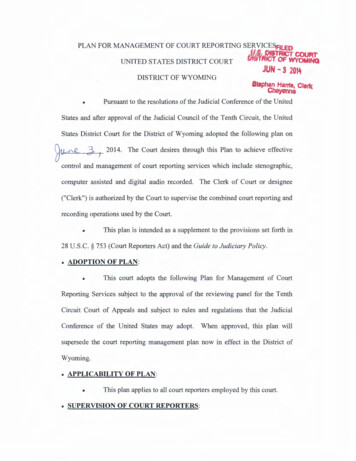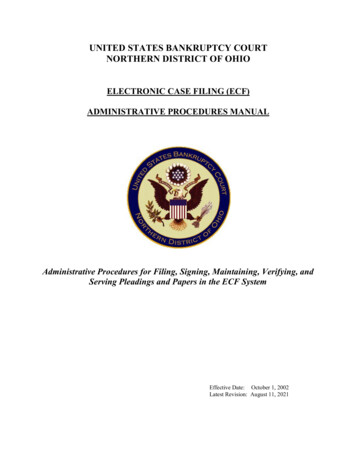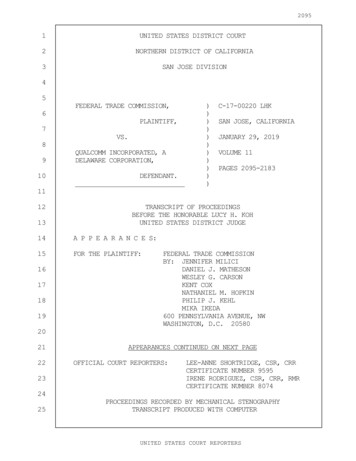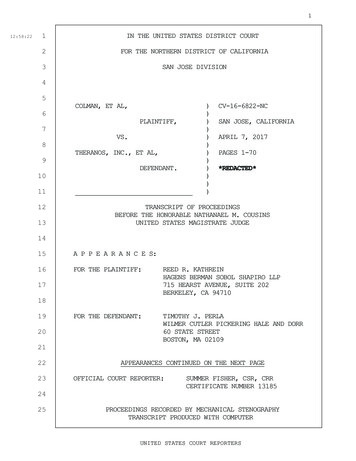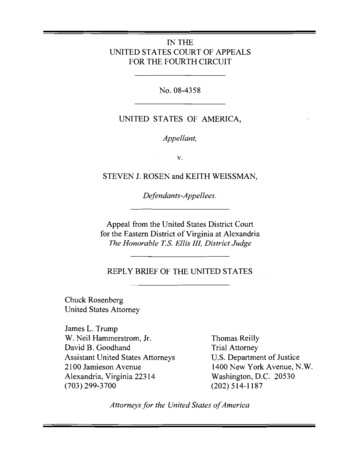
Transcription
IN THEUNITED STATES COURT OF APPEALSFOR THE FOURTH CIRCUITUNITED STATES OF AMERICA,Appellant,STEVEN J. ROSEN and KEITH WEISSMAN,Defendants-Appellees.Appeal from the United States District Courtfor the Eastern District of Virginia at AlexandriaThe Honorable T.S. Ellis 114 District JudgeREPLY BRIEF OF THE UNITED STATESChuck RosenbergUnited States AttorneyJames L. TrumpW. Neil Hammerstrom, Jr.David B. GoodhandAssistant United States Attorneys2 100 Jamieson AvenueAlexandria, Virginia 223 14(703) 299-3700Thomas ReillyTrial AttorneyU.S. Department of Justice1400 New York Avenue, N.W.Washington, D.C. 20530(202) 514-1 187Attorneys for the United States of America
TABLE OF CONTENTSINTRODUCTION . . . . . . . . . . . . . . . . . . . . . . . . . . . . . . . . . . . . . . . . . . . . . . . . . . 1ARGUMENT . . . . . . . . . . . . . . . . . . . . . . . . . . . . . . . . . . . . . . . . . . . . . . . . . . . . . . 2I.THE DISTRICT COURT'S ERRONEOUS ANALYSISOF 18 U.S.C. 4 793 PERVADED THE ENTIRE CIPA PROCESS . . . . . . . 2I1.THE CLASSIFIED INFORMATION AT ISSUE IS NOT RELEVANT ORESSENTIAL . . . . . . . . . . . . . . . . . . . . . . . . . . . . . . . . . . . . . . . . . . . . . . . . 13I11.SECTION 793 IS NOT CONSTITUTIONALLY INFIRM AS APPLIED TOTHE DEFENDANTS . . . . . . . . . . . . . . . . . . . . . . . . . . . . . . . . . . . . . . . . . 32CONCLUSION . . . . . . . . . . . . . . . . . . . . . . . . . . . . . . . . . . . . . . . . . . . . . . . . . . . 35
TABLE OF AUTHORITIESFEDERAL CASESAlfredA KnopJ Inc. v. Colby, 509 F.2d 1362 (4th Cir . 1975) . . . . . . . . . . . . . . . 29Arnett v. Kennedy, 416 U.S. 134 (1974) . . . . . . . . . . . . . . . . . . . . . . . . . . . . . . . . 35Diaz v. Unitedstates, 853 F.2d 9 (1st Cir . 1988) . . . . . . . . . . . . . . . . . . . . . . . . . 10Gorin v. United States, 3 12 U.S. 19 (1941) . . . . . . . . . . . . . . . . . . . . . . . . . . . . . 34Horne v. Owens-Corning Fiberglass Corp., 4 F.3d 276 (4th Cir . 1993). . . . . . . 13Jean v. Nelson. 472 U.S. 846 (1985) . . . . . . . . . . . . . . . . . . . . . . . . . . . . . . . . . . . 10McGehee v. Casey. 718 F.2d 1137 (D.C. Cir . 1983) . . . . . . . . . . . . . . . . . . . . . . 34Salt River Project Agricultural Improvement andPower District v. United States. 762 F.2d 1053(D.C.Cir.1985) . . . . . . . . . . . . . . . . . . . . . . . . . . . . . . . . . . . . . . . . . . . . . .10Siang Wang v. INS. 413 F.2d 287 (9th Cir . 1969) . . . . . . . . . . . . . . . . . . . . . . . . 10Unitedstates v. Abu Ali, 528 F.3d 210 (4th Cir . 2008) . . . . . . . . . . . . . . . . . . . . .5United States v. Anderson, 872 F.2d 1508 (1 lth Cir. 1989) . . . . . . . . . . . . . . . . . 13United States v . Cardoen. 898 F.Supp. 1563 (S.D. Fla . 1994) . . . . . . . . . . . . . . . 13Unitedstates v. Fernandez. 887 F.2d 465 (4th Cir . 1989) . . . . . . . . . . .4,5. 12. 30Unitedstates v. Morison. 844 F.2d 1057 (4th Cir. 1988) . . . . . . . . . . . . . 6.33. 34Unitedstates v. Moussaoui. 382 F.3d 453 (4th Cir. 2004) . . . . . . . . . . . . . . . . . . 5
Unitedstates v. Moussaoui, 65 Fed. App'x 881(4th Cir. 2003) (unpublished) . . . . . . . . . . . . . . . . . . . . . . . . . . . . . . . . . . 29United States v. Pelton, 696 F.Supp. 156 (D. Md. 1986) . . . . . . . . . . . . . . . . . . 29United States v. Rosen, 520 F. Supp. 2d 786(E.D.Va. 2007) . . . . . . . . . . . . . . . . . . . . . . . . . . . . . . . . . . . . . . . . . . . . 6, 1 1United States v. Santiago-Godinez, 12 F.3d 722 (7th Cir. 1993) . . . . . . . . . . . . . 13United States v. Smith, 780 F.2d 1102 (4th Cir. 1985) . . . . . . . . . . . . . . . . . . 4, 12United States v. Truong, 629 F.2d 908 (4th Cir. 1980) . . . . . . . . . . . . . . . . . . 6,34FEDERAL STATUTES18U.S.C.5793. . . . . . . . . . . . . . . . . . . . . . . . . . . . . . . . . . . . . . . . . . . . . . passimOTHER AUTHORITIESSection 6 of the Classified Information ProceduresAct(CIPA), 18 U.S.C., App. 3 . . . . . . . . . . . . . . . . . . . . . . . . . 3,4,7,11, 12Section 6(a) of the Classified Information ProceduresAct (CIPA), 18 U.S.C., App. 3 . . . . . . . . . . . . . . . . . . . . . . . . . . . 4-6, 12,23Section 6(c) of the Classified Information ProceduresAct(CIPA), 18U.S.C., App. 3 . . . . . . . . . . . . . . . . . . . . . . . . . . . . . . . . . . 30
IN THEUNITED STATES COURT OF APPEALSFOR THE FOURTH CIRCLJITUNITED STATES OF AMERICA,Appellant,v.STEVEN J. ROSEN and KEITH WEISSMAN,Defendants-Appellees.Appeal from the United States District Courtfor the Eastern District of Virginiaat AlexandriaThe Honorable T.S. Ellis III, District JudgeREPLY BRIEF OF THE UNITED STATES1(U) The United States respectfully submits this reply to the Appellees' brief.As we show, Appellees have failed to refute our contention that the district court1The markings on each paragraph indicate the classification level of that paragraph,(U), (S), (TS) or (C), or that the paragraph contains sealed material (SM).
erroneously authorized the disclosure of irrelevant classified information at trial inthis matter.ARGUMENTI.THE DISTRICT COURT'S ERRONEOUS ANALYSISOF 18 U.S.C. tj 793 PERVADED THE ENTIRE CIPA PROCESS.(U) In our opening brief, we showed how the district court abused itsdiscretion in ordering the disclosure of certain classified information.Specifically, we singled out two documents that reflected particularly egregiousexamples of two overarching errors -the district court improperly grafted on toSection 793 several additional intent elements that are nowhere to be found in thestatute and the district court repeatedly mis-applied the test by which thegovernment's classified information privilege is adjudged. In their response, thedefendants proffer several arguments as to why - from their perspective -thecourt did not abuse its discretion with respect to these admissibility rulings. Weaddress those specific arguments in detail below. But, first, we pause to correct afundamental misunderstanding that permeates the defendants' response brief.(U) In their brief, the defendants repeatedly emphasize the "extraordinarydeference" due a "district court's CIPA relevance determination" and devotemany pages of their brief to a detailed recitation of the district court's
"meticulous" and "careful" CIPA Section 6 process. See, e.g., Def. Br. 14, 18,20-24. We do not disagree that the district court has devoted a great deal of timeand energy to the CIPA Section 6 process.2 The defendants miss the point,however, when they exclusively focus on the CIPA process as it un-folded afterthe court articulated its understanding of the elements of the charged Section 793offense, i.e., after the court articulated its understanding of the substantive legaltemplate by which it adjudged (a) relevancy and (b) application of thegovernment's classified information privilege. For, as we noted in our openingbrief, although we have chosen just two documents for this Court's particularizedreview, the district court's erroneous reasoning with respect to, inter alia, therequisite elements of a Section 793 violation "pervade[d] the entire CIPAprocess." Gov. Br. at 26; see also id. at 28 n.9. And, as we also noted, it is afundamental truism that, where a district court's discretionary decision-making ispremised on, for example, an "erroneous view" of a statute's elements -as was the2(U) The defendants go to great lengths (Def. Br. at 21-22) to numerically catalogthe proceedings below, citing numbers of rulings, days of hearings and pages oforders. We do not disagree with the defendants' arithmetic. Rather, we disagree withtheir two-fold suggestion that numerous pages of transcript, for example, necessarilytranslate into substantively correct rulings andlor that multiple days of hearingsnecessarily means that the district court did not commit legal error before conductingthose hearings.
case here with respect to Section 793 -the court's "admission of classifiedinformation. . . is, by definition, an abuse of discretion." Id. at 29.(U) To understand fully the above point, it is first necessary to return to thebasics of the ClPA process. As this Court explained in United States v.Fernandez, 887 F.2d 465 (4" Cir. 1989), ClPA was enacted to "confront theproblem of a criminal defendant who 'threatens to reveal classified informationduring the course of his trial in hope of forcing the government to drop thecriminal charge against him."' Id. at 466 (citation omitted). Thus, once thedefendant gives notice of the classified information he intends to disclose, the firststep in the ClPA Section 6 process is a hearing at which the court "shall determinethe 'use, relevance, or admissibility"' of the classified information. Id. (quotingCIPA Section 6(a)). Further, even if the district court determines that classifiedinformation is "relevan[t],"' when the government invokes its classifiedinformation privilege, the district court must further adjudicate "whether anyrelevant evidence was admissible in light of the applicable government privilege."United States v. Smith, 780 F.2d 1102, 1 110 (4" Cir. 1985) (en banc). This, inturn, requires the district court to conduct the following assessment of the(U) Relevance, of course, describes a relationship between an item of evidence anda matter properly provable at trial. See Fed. R. Evid 401.
proffered evidence: "A district court may order disclosure only when theinformation is at least 'essential to the defense'; 'necessary to his defense'; andneither merely cumulative nor corroborative; nor speculative." Id. (citationsomitted); see also UnitedStates v. Abu Ali, 528 F.3d 210, 247 (4thCir. 2008);UnitedStates v. Moussaoui, 382 F.3d 453,476 (4" Cir. 2004) ("Under CIPA, oncethe district court determines that an item of classified information is relevant andmaterial, that item must be admitted unless the government provides an adequatesubstitution."). As part of this assessment, this Court has articulated the followingfactors that a district court must consider: "A decision on disclosure of suchinformation must depend on the particular circumstances of each case, taking intoconsideration the crime charged, the possible defenses, the possible signiJicanceof the [evidence,] and other relevant factors." Abu Ali, 528 F.3d at 247 (emphasisadded; citations and internal quotation marks m i t t e d ) . (U) Here, our point is a simple one - as we demonstrated in our openingbrief (at 29-48), from the very outset of this case, the district court has beenlaboring under a basic misunderstanding about the elements of the "crime4(U) It is only after the district court has made these initial Section 6(a) rulings thatthe court then moves on to an assessment of substitutions, if any: "If the courtauthorizes disclosure of classified information, the United States may move that thecourt instead accept either a substitute admission of relevant facts or a substitutesummary of the information." Fernandez, 887 F.2d at 466.
charged." Specifically, as we showed, one necessarily searches Section 793 invain for the numerous judicial "glosses" that the district court imposed - way backin August of 2006 -on the statute's otherwise straightforward willfulnessrequirement.5 As we also showed (at 33-36), the court's "glosses" fly in the faceof this Court's many Section 793 precedents, such as United States v. Morison,844 F.2d 1057 (4" Cir. 1988), where this Court expressly approved a Section 793jury instruction that defined willful intent as simply "'specific intent to dosomething the law forbids. That is to say, with a bad purpose to disobey ordisregard the law."' Id. at 1071; see also United States v. Truong, 629 F.2d 908,919 (4' Cir. 1980) (same). Accordingly, the district court's subsequent CIPASection 6(a) balancing assessment -whereby the court engaged in a weighing ofthe relevancy and necessity of the classified evidence in light of the "particularcircumstances" of the case, including the "crime charged" and the "possible5(U) As the district court summed up its ruling on the Section 793 elements, thegovernment's "conspiracy charge fails absent proof of the[ following] mental stateelements" -"the defendants (i) knew that the information the conspiracy sought toobtain and disclose was NDI, i.e.,knew that the information was closely held by thegovernment and that the disclosure of the information would be damaging to thenational security, (ii) knew the persons to whom the disclosures would be made werenot authorized to receive the information, (iii) knew the disclosures the conspiracycontemplated making were unlawful, (iv) had reason to believe the informationdisclosed could be used to the injury of the United States or to the aid of a foreignnation, and (v) intended that such injury to the United States or aid to a foreign nationresult from the disclosures." 520 F. Supp. 2d at 793.
defenses" - has necessarily been tainted. The defendants are thus wrong whenthey suggest (Def. Br. at 7) that the government is improperly "seek[ing] to usethis CIPA appeal as a backdoor to appeal the constitutional issues." The so-called"back door" constitutional issues are inextricably intertwined with the propriety ofthe district court's CIPA Section 6 Order.(U) As to our "inextricably intertwined" point, we ask this Court toconsider the following: throughout the lengthy CIPA process, the defendants notsurprisingly used the district court's unique and, in our opinion, erroneousfindings regarding the required mental state and intent elements of a Section 793offense to define what evidence is, in their view, relevant to their proffereddefenses; and the district court frequently agreed with their assessment. In thisregard, as we noted in our opening brief, should this Court reverse the districtcourt and redefine relevance as we suggest, a substantial amount of classifiedinformation would potentially be affected - not simply the FBI Report and theIsraeli Briefing document. See Gov. Br. at 28 n.9. This is true because CIPArequires the district court to engage in a balancing of the government's anddefendants' sometime competing interest. If one side of that equation changes, aswe suggest it must, the outcome may change as well.
-(U) This is why this Court cannot simply exercise "judicial restraint" andaffirm the district court's admissibility rulings on alternative grounds as advocatedby the defendants. The court's statutory construction, complete with itsconstitutional gloss, informed and guided many of its CIPA determinations. Thealternative grounds advocated by the defendants are, therefore, equally affected bythe district court's erroneous rulings. They are inseparable.(U) We acknowledge that the doctrine ofjudicial restraint teaches thatfederal courts must consider non-constitutional grounds for decision, but only ifthose other grounds adequately dispose of the controversy. It is ironic that
defendants now cry for judicial restraint when they are, in fact, asking this Courtto sanction a strained and unnecessary constitutional analysis by the district court,especially when that court could and should have followed this Court's precedentfrom other Section 793 cases. We, not the defendants, are asking this Court toimpose such restraint on the court below.(U) The rule of judicial restraint usually applies when a court is faced witha regulation or statute which, if interpreted or applied one way, raisesconstitutional questions, but if interpreted another way avoids those constitutionalquestions. Diaz v. United States, 853 F.2d 9-10 (1st Cir. 1988)(observing that,even if one ground for dismissal of a postal worker was constitutional, the otherunconstitutional grounds played a part in the decision and remand was appropriatefor reconsideration of the decision in light of the error), citing Salt River ProjectAgricultural Improvement and Power District v. United States, 762 F.2d 1053,1061 n 8 (D.C. Cir. 1985); Siang Wang v. INS, 413 F.2d 287 (9th Cir. 1969);American Public TransitAss'n v. Lewis, 655 F.2d 1272, 1279 (D.C. Cir. 1981).Similarly, in Jean v. Nelson, 472 U.S. 846 (1985), cited by the defendants, theSupreme Court observed that the relief requested was available to the petitionerwithout the need to rule on the constitutional question. Here, we are similarlyarguing that remand is appropriate for reconsideration of the CIPA findings
without regard to the unnecessary and flawed constitutionally-based constructionof Section 793.(UISM); see also JAU 278 ("It seems
to me that it would be useful to have this matter reviewed at the Court of Appealsat this time, as well."). In this regard, the district judge quite forthrightly concededthat he "may not have gotten it right." JAU 279.(U) In sum, the defendants are wrong when they repeatedly invokeFernandez's "extraordinary" and/or "great" deference as the beginning and end ofthis Court's CIPA review function. See Br. at 14, 18-19,26, 50, 51. Applicationof Fernandez's deference is only appropriate ifthe district court, first, has properlyunderstood the elements of the "crime charged." For, absent such a properunderstanding of the precise nature of the government's statutory burden, thedistrict court cannot properly adjudicate either the relevancy of the classifiedinformation (the first step in the Smith Section 6(a) process) or the materiality ofthis classified information in the face of the government's classified informationprivilege (the second step in the Smith Section 6(a) process). We do not believethat the district judge has properly articulated the government's statutory burden.We thus concomitantly believe that his CIPA Section 6 rulings are not entitled toany particular deference, "extraordinary" or otherwise. Nor do we believe that thisCourt should feel restrained to ignore the district Court's erroneous statutoryelements ruling. At any rate, as we show below, even if such restraint is exercised,the court's rulings still do not pass muster.
11.THE CLASSIFIED INFORMATION AT ISSUE IS NOT RELEVANTOR ESSENTIAL.(U) As established in our opening brief, the defendants did not set forth anyvalid defense for which the Israeli Briefing Document or the un-redacted FBIReport is relevant and admissible. Gov. Br. at 29-53. In their brief, the defendantssimply recite the erroneous bases upon which the court found the documentsrelevant and make many assertions unsupported by any citation to, or supportfrom, the record below. See, e.g., Def. Br. at 39.7 Because the information is notrelevant, it cannot be essential, such as to overcome the government's classifiedinformation privilege.(U) Moreover, as an initial matter (Gov. Br. at 28-29), while the district court'sdeterminations as to what particular item of classified information is relevant to aparticular defense may be entitled to deferential review, the court's finding that aparticular defense is a valid defense and available to the defendants is amixed factualand legal question subject to de novo review. See United States v. Anderson, 872F.2d 1508, 1515-16 (11th Cir. 1989)(in CIPA case, reviewing court must firstdetermine whether a proffered defense was valid as a matter of law, beforeconsidering whether the exclusion of evidence in support of that defense was anabuse of discretion); United States v. Cardoen, 898 F.Supp. 1563, 1572 (S.D. Fla.1994)(defendants at a CIPA hearing bear the burden of showing that their asserteddefenses are valid and the validity of proffered defenses is a legal question); UnitedStates v . Santiago-Godinez, 12 F.3d 722, 727 (7th Cir. 1993)(de novo review is theappropriate standard to review a pretrial determination that the defendant did notpresent sufficient evidence to raise the defense of entrapment); Horne v. OwensCorning Fiberglass Corp.,4 F.3d 276,280 (4th Cir. 1993)(admissibility of evidencepurportedly covered by the attorney-client privilege is a mixed question of law andfact necessitating de novo review).
A.The Israeli Briefing Document Is Not Relevant or Essential.(UISM)The defendants begin their discussion of the Israeli BriefingDocument (at 39-40) with a recitation of the "factual background." For many ofthese "factual" assertions, there is no evidence of them in the record sufficient toestablish any relevance for the disclosure of the classified information.
2.The Israeli Briefing Document does not contain theclassified information defendants obtained and disclosed.(U) Notably, for all the unsupported assertions the defendants make, theydo not once quote from the Israeli Briefing Document itself. Defendants claim (at39), without citation, that "most" of the information Satterfield gave Rosen can befound in the Israeli Briefing Document. Review of the document itself and acomparison to the classified national defense information (NDI) Satterfield9(U) The Israeli Briefing Document's relevance is even further attenuated if thedefendants did not attend the AIPAC briefing, or did not receive a briefing directlyfrom the Israelis. In that instance, the "best evidence" would be the person(s) fromwhom the defendants received the briefing. Notably, although Rosen discusses theKuppenvasser briefing to the State Department, nowhere in any of the recordedconversations or email messages does either defendant definitively state that heattended a briefing by Kuppenvasser.
disclosed to Rosen (and Rosen further disclosed) belies the defendants' assertionsand the validity of their "defenses." See JAC 333-339.(U) Of course, the document also does not reveal anything relating to what, ifanything the Israelis told AIPAC or the defendants.'O
3.(S)United States intelligence and Israeli intelligence aredistinct.
" (S)
''(U) Defendants also contend that there is no difference between an "intent toinjure the United States" and "'reason to believe" the disclosure will cause injury tothe United States or aid a foreign country. Br. at 46,54-55. They argue, in essence,that the district court really meant "reason to believe" when he said "intent." Br. at54. The statute's plain language states: "Whoever, unlawhlly having possession of. . information relating to the national defense which information the possessor hasreason to believe could be used to the injury of the Unitedstates or to the advantage
B.The Information Redacted from the FBI Report Is Irrelevant.(UISM) As we set forth in our opening brief, (58-60), the governmentsought, pursuant to ClPA Section-)a6(of any foreign nation . . ." 18 U.S.C. 8 793(d) (emphasis added)(Section 793(e)contains the same language). The "reason to believe" set forth in the statute appliesto the information -- not the disclosure. Thus, the government need not prove that thedefendant had "reason to believe" the disclosure would result in injury to the UnitedStates or advantage to any foreign nation. Rather, the government need only provethat the possessor had reason to believe the information itself, regardless of anydisclosure, could be used to such ends. The district court improperly transposed thisstandard from the information to the disclosure, contravening the statute's plainlanguage. Consequently, the defendants' attempt to cure the court's error fails.
c(U) That is the NDI at issue. Those are the details Weissman disclosed, andthose are the details that are fully available to the defendants at trial in theproposed redacted FBI Report submitted by the government. The otherinformation in the report, not otherwise seen or disclosed to or by the defendants,is not relevant.(S)
17(UJSM) Defendants state that a government expert could not determine what isclassified from a classified document because they could not determine "which of thepotentially damaging sentences [in a classified paragraph] motivated the originalclassifier." Br. at 38. They assert this is especially true in the context of "policy64, 74. Additionally, of course, in this case, this is classified FBI investigativeconclusions, not "policy information."
-(S) This Court has recognized that "'l:i]t is one thing for a reporter or authorto speculate or guess that a thing may be so or even, quoting undisclosed sources,to say that it is so; it is quite another thing for one in a position to know of itofficially to say that it is so."' UnitedStates v. Moussaoui, 65 Fed. App'x 881,887(4th Cir. 2003) (unpublished) quoting A p e d A Knopf; Inc. v. Colby, 509 F.2d1362, 1370 (4th Cir. 1975); see also UnitedStates v. Pelton, 696 F.Supp. 156, 158(D. Md. 1986) ("[Tlhere is a difference between speculation and confirmation.").
(UISM)Defendants arealready able to demonstrate, from information available to them in the document,that it contains such details (as set forth in the "Summary" paragraphs JAC 309).The specifics are of no moment.1
111.SECTION 793 IS NOT CONSTITUTIONALLY INFIRM ASAPPLIED TO THE DEFENDANTS.(U) Defendants aver that this Court need not reach the constitutional issuessurrounding the application of the statute to this case, but, if this Court does so, itshould first determine whether statutory construction would remedy any FirstAmendment and Due Process issues. Br. at 57-58.(U) First, contrary to their contention, this is not simply a case ofdefendants engaged in the benign collection and discussion of foreign policyinformation, whose conduct enjoys First Amendment protections. Br. at 59.Indeed, electronic intercepts of defendants' conversations gathered during theinvestigation establish the requisite mens rea and satisfy the "willfulness" elementof Section 793 without the need for the judicial glosses imposed by the districtcourt. See Gov. Br. at 5- 13. Had the district court properly analyzed thegovernment's willful intent evidence when ruling on the application of the statuteto this case, it should have rejected, outright, the defendants' "as applied"vagueness challenge. No additional intent elements are necessary in light of thecompelling evidence of defendants' willful intent.19l9(U) While the defendants cite (at 60, n.35, 62) a host of media and law reviewarticles criticizing the district court's decision not to dismiss the indictment on FirstAmendment grounds, such sources merit no consideration. Given that many of thefacts of the case are classified and, by necessity, shrouded from public scrutiny, these
(U) In United States v. Morison, 844 F.2d 1057 (41hCir. 1988), the FirstAmendment concerns were allayed not simply because of Morison's status as agovernment employee - as not all government employees have access to classifiedinformation, have intelligence expertise, or made explicit promises to protectclassified information - but rather as a result, inter alia, of the knowledge hepossessed by that employment, specifically that the information he communicatedwas classified and was intelligence information. In this case, while notgovernment employees, recorded conversations and other facts establish that thedefendants possessed thetype of knowledge as Morison - knowledge ofclassification, intelligence sources and methods, and the sensitivity of theinformation they obtained and disclosed.20(U) Equally unpersuasive in the defendants' constitutional challenges istheir contention that the Section 793 phrases "information relating to the nationalcritics are uninformed and not privy to the very evidence they wrongly claim isdeserving of First Amendment protection.(U) In sentencing co-conspirator Franklin on January 20,2006, months before thedistrict court's opinion adding new elements to Section 793, the district judgerecognized that Franklin "didn't want to hurt the United States" but that what he haddone was "a violation of the law, no matter what [his] motive may have been." Thecourt also admonished Franklin that "all persons . . . who come into possession. . .of classified information, must abide by the law"; and "that applies to academics,lawyers, journalists, professors, whatever." JAU 282-83.20
defense" and "not entitled to receive it" are impermissibly vague as applied tothem. The cases that have addressed these vagueness claims draw no distinctionin the class of defendants to which the statute has been applied. See, e.g.,Morison, 844 F.2d at 1067 ("the legislative history does not justify the rewriting ofthis statute so as to nullify its plain language by limiting the statute's applicationto the 'classic' spy").(U) This Court has previously held that vagueness attacks on the"information relating to the national defense" prong have been overcome througha combination of jury instructions on "willfulness" and a definition of "nationaldefense." Id. at 1071-72; Truong, 629 F.2d at 919. In construing the phrase in thepredecessor statute to 793, the Supreme Court in Gorin v. United States, 3 12 U.S.19,28 (1941), found that the phrase has a "well understood connotation" and isnot impermissibly vague.(U) Addressing vagueness challenges to the phrase "entitled to receive,"this Court has held that "any omission in the statute is clarified and supplied by thegovernment's classification system." Morison, 844 F.2d at 1074 (citing 18 U.S.C.App. 1); Truong, 629 F.2d at 919; McGehee v. Casey, 7 18 F.2d 1137, 1143-44(D.C. Cir. 1983). Moreover, as well-educated foreign policy experts grounded inthe inner workings of government, a demonstrated knowledge of the classification34
system, and Rosen's prior security clearance, the defendants have at least, if notmore than, the ordinary common sense necessary to sufficiently understand andcomply with the terms set forth in a statute such that it will not be struck down asvague. Arnett v. Kennedy, 416 U.S. 134, 159 (1974).CONCLUSION(U) For the foregoing reasons, the district court's CIPA rulings, as detailedin our initial brief, were erroneous and should be reversed.Respectfully Submitted,Chuck RosenbergUnited States AttorneyL.cdwmes L. TrumpW. Neil Hammerstrom, r.David B. GoodhandAssistant United States AttorneysThomas ReillyTrial AttorneyU.S. Department of Justice
STEVEN J. ROSEN and KEITH WEISSMAN, Defendants-Appellees. Appeal from the United States District Court for the Eastern District of Virginia at Alexandria The Honorable T.S. Ellis 114 District Judge REPLY BRIEF OF THE UNITED STATES Chuck Rosenberg United States Attorney James L. Trump W. Neil Hammerstrom, Jr. Thomas Reilly








